Wankel Project: 1972 NSU Ro 80
It’ll take a very dedicated aficionado to take on the restoration of this 1972 NSU Ro 80. It has been sitting undriven for years, according to the seller who has it listed here on eBay. It’s located in Cleveland, Ohio and there is a single bid of $1,000 on it and no reserve. Let’s check out this very unusual and very special car, NSU’s Rotary engine Type 80: the Ro 80.
Reported by some to be the first, and by many to be one of the first mass-produced Wankel rotary-powered cars – which, because of human nature, means that it’ll be the mission of many readers to find an earlier example – the NSU Ro 80 was a relatively low-production car. The company made around 37,400 of them over a decade before production ended in 1977. Actually, I’ll break the ice: the Mazda Cosmo was an earlier example with a two-rotor Wankel engine, although both cars debuted in 1967. The Ro 80 is a very interesting and handsome design, in my opinion. At the time production started in 1967, it could be argued that the Ro 80 was one of the most advanced cars being produced anywhere in the world.
The Wankel engine technology was expensive to produce and problems arose almost immediately and persisted, which eventually brought down the West German NSU house of cards like Tiger jumping up on Greg Brady. Because – “everything counts when you’re building a house”… (Brady Bunch reference) Are you still with me? NSU was acquired by Volkswagen in 1969, merged with Auto Union, and eventually evolved into Audi. This car has been parked for years according to the seller and there is some rust on it. Three of the four doors appear to have been repainted, I’m not sure what that’s about, but here is a reference showing some potential rust areas to watch for on the Ro 80. The underside looks clean other than some rust in the front and rear sections underneath.
The dash is cracked but other than that the interior looks good to me. These should be Audi-sourced seats and they look great both front and rear. I’m not sure what those tan pieces are on the floors, is the black carpet just missing in those areas? There is no clutch pedal and the transmission isn’t a manual, despite the manual-looking stick shift on the floor. It’s a 3-speed semi-automatic Fichtel & Sachs that used vacuum and electric switches that would disengage the clutch as the car was shifted like a manual, rather than pressing on a clutch pedal.
The engine is a 113 hp, 995 cc Wankel two-rotor engine that turns over but doesn’t run. This car was last registered in 1985 and hopefully someone can get this important car back on the road again. This car is listed on Hemmings for $12,950 so I have a feeling that this eBay listing may disappear before the end of the auction if the bids don’t significantly rise towards that number. Hagerty is at $3,600 for a #4 fair condition car which is above the condition that I would place this example to be in, so maybe they’ll let the auction run its course. Have any of you owned a rotary-powered vehicle? Extra points for owning an NSU Ro 80!
Auctions Ending Soon
 2006 Ford Mustang Saleen S281 SCBid Now21 hours$15,000
2006 Ford Mustang Saleen S281 SCBid Now21 hours$15,000
 2002 Subaru Impreza WRXBid Now3 days$100
2002 Subaru Impreza WRXBid Now3 days$100
 1975 Chevrolet Corvette ConvertibleBid Now3 days$3,000
1975 Chevrolet Corvette ConvertibleBid Now3 days$3,000
 1964 Ford F-100 Camper CustomBid Now3 days$2,000
1964 Ford F-100 Camper CustomBid Now3 days$2,000
 2006 Jeep Wrangler SportBid Now5 days$10,500
2006 Jeep Wrangler SportBid Now5 days$10,500
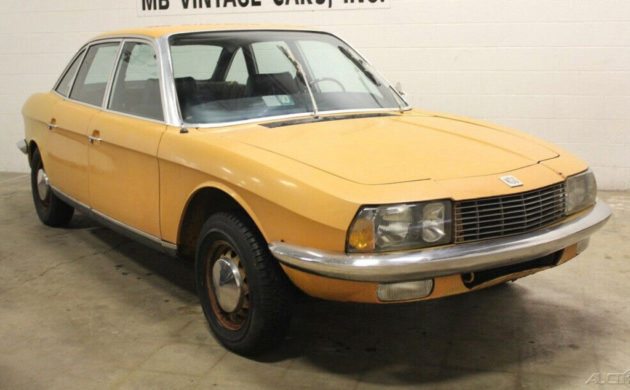
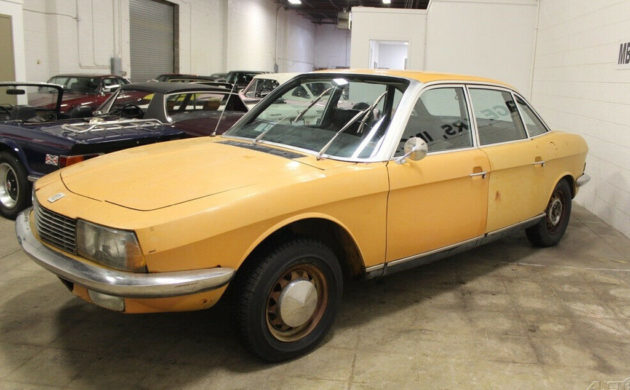
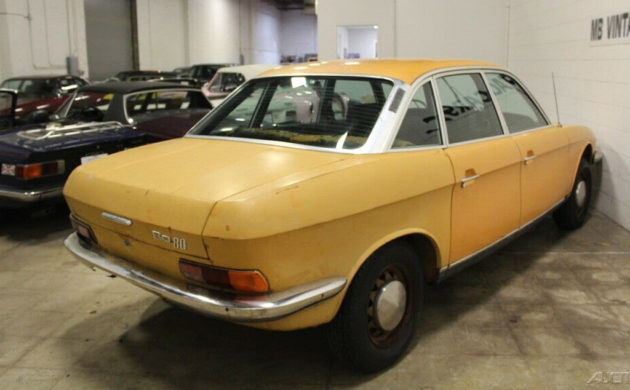
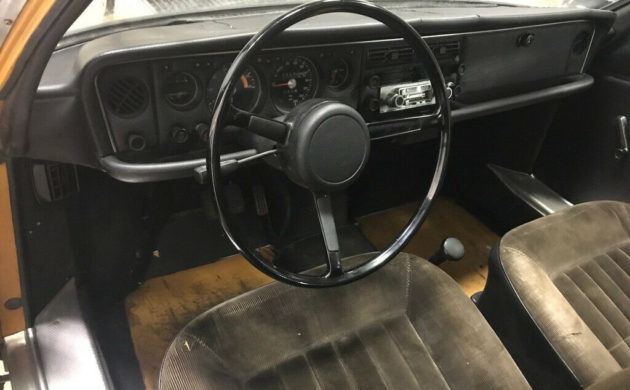
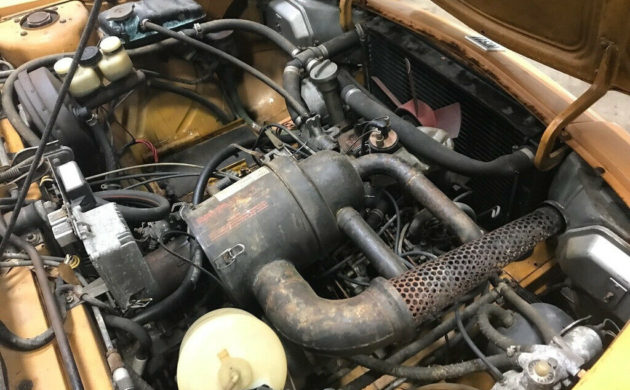

Comments
The Wankel engine is an engineer’s dream and an engineer’s nightmare rolled into one. The concept is delightfully simple, the reality is anything but. Manufacturing cost, oil consumption, fuel consumption, emissions, and seal issues have never been fully overcome, even 50 years later. Rumor has it Mazda is working on an RX-9, powered by an inline six.
Nonetheless, a neat find. I hope someone resurrects it.
Inline six?
Yep. An inline six based on their Skyactiv 4-cylinder. Just a rumor, but interesting.
CC – the rumor I prefer to believe is the one with a new Wankel. The artwork for the body is stunning. Having had an ’83 RX7 long term that I had “massaged”, I’d really be tempted to buy another. This Ro80 is, in my opinion, lovely (for a 4-door). I saw them in Germany for model years ’67-’69 during my Army service, and got to drive one. Would prefer a stick. Would also prefer to have a 4 car garage, as this would be a great addition…
Where do you people come up with this bs? Rx means rotary Mx is piston. No rx9 with 6 will ever come out of Hiroshima. Also the engines are extremely durable if you not an idiot. I have 3rd gen rx7s been thru hell and still ticking on it’s original engine.
I personally like the looks and the forward thinking of these NSU’s. I did a quick parts look up on Napa and I could not find a set of apex seals:) on a serious note a search with Mr. Google came up empty on any attempts to rebuild one. Maybe someone will chime in on that but if you are a good machinist it might be possible to modify the rotor to accept Mazda seals after they have been modified to fit the different size rotor. Or one could work with Kennedy Engineering to make a adaptor plate to mate a 13b to a NSU transaxle. I would sure want to keep it Wankel though.
You can see the eventual Audi lineage.
I have always thought these to be a beautiful car, even with the slightly odd rear end, but the overall shape of the car just does something for me. Now NSU purists will hunt me down for saying this, but like alfasud said, I think some sort of drivetrain swap might be a good idea. I think it very much deserves to be saved and driven. Maybe like he said, a 13b swap, or maybe something from Honda with some engineering. Just a thought. I love these cars…
The 13B is a good swap and was very commonplace in the 80’s / 90’s. But a lot of the comments here are taking the assumption that the Ro80 is in some way not usable with the NSU unit. This is not the case, as well maintained original engines will do very acceptable mileages. And further to that, Ceramic apex seals are now available from the Ro80 Club International which produce zero wear on the housing surface. I personally have covered countless miles around Europe in Ro80’s running on their original engines, with no issues. This is why you’ll tend to find so few converted cars these days as the majority have been changed back.
A friend of mine had a Mazda Luce and a Mazda RX2, one of which was kept in South Africa and the other in Oklahoma. He would spend 6 months of each year in SA and six months in USA and on his return to either country his first job on either cars was to replace the rotor seals. Evidently if the engine is not turned the seals stick and on the first revolution the tips break off and then there is no compression. Both very heavy on gas but also both very fast off the line. Not many cars of the era could stay with them.
Sorry but I’ve never heard such nonsense! I’ve worked on these engines for over 30 years and have never had a tip “break off” after turning the engine.
Not nonsense at all. The info came from the owners mouth, not hearsay, and it only refers to MAZDA rotary engines, not necessarily to NSU RO 80.
Sorry I just don’t buy it, regardless of what he told you or not. I mentioned your comment in a couple of rotary groups. And the concept that the tips would just “break off” on the basis that the car hadn’t been driven for six months was laughed at. I’ve dragged out cars (Mazda & NSU) from decades of standing in all manner of environments and have never encountered that. If you ever have the opportunity to closely examine a rotor tip in its rotor, then I suggest you do so.
Hi Phil B. Thank you for your comments, however, as I mentioned I was only reporting on what my friend who owned the cars, told me. Looks like it was a load of BS. At least we have all learned a lot more about Rotary engines than we knew a week ago.
Hi Ken, seems like he was! These engines haven’t been without their problems, particularly in the early years. But I’ve seen so many things posted on the internet that simply aren’t true. And the problem is X amount of people read those comments. Then they believe it themselves and then it gets spread onwards. If I’m at a show, I often stand close to my car to listen to all the “experts” educating those with them, with their own inaccuracies!
Anyway, Hope it didn’t seem like I was having a go 😀.
I’ve owned rotary engined cars, I’ve raced rotary engined cars. I swapped a Mazda RX4 into an Ro80-it was great. The Mazda rotary had 130 hp and much more torque. Guy in Canada put the few mods needed in print.
Hideous!
To each one’s own.
Beauty is in the eye of the beholder.
I’ve never owned a Ro80, but I did once go looking at one for sale. I always thought they looked really cool with the futuristic Claus Luthe design, and I had owned several NSU and also a couple of VW K70 so I felt the Ro80 was to be a culmination of NSU’ness. Sorry to say that it was quite a disappointment to drive.
Most of the car is ok with nice handling, firm German suspension and a comfortable interior. But the drivetrain sucks. The combo of a torque-less Wankel engine, a hydraulic torque converter and that weird manual transmission with automatic clutch made it pretty underwhelming to drive. Slow, and no throttle response. If it had come out with the K70LS engine it might have had a chance, but the drivetrain killed the Ro80 – not necessarily for its abysmal reliability or high fuel consumption but because of its lack of performance and driver enjoyment.
Firm german suspension!… I think not. Are you sure you drove one of these and didn’t just imagine it all?. In its day the ride and road handling was amazing and earned it many accolades… usually jaguar comparisons.
Seller already pulled listing, said due to error in listing. Even though it said no reserve I bet he put the wrong starting price, and meant it to be higher or some 80 fan reached him with a offer he could not turn down.
yep, some Puget and Audi stylin hints here.
Don’t forget to use 2 separate sentences for wankel engines and rotary engines. The 2nd is an advancement on the 1st (al la mazda’s sport coupe). We had a coupla old ‘econo boxes’ in the yard – just pulled the units to sell for dragsters, the shells to the metal man. Huge gas consumption, no?
The motors remind me of the early ’80s sm diesels (chevette, courier, etc) by isuzzu & nissan that just didn’t work…
Let Jay Leno know about this puppy. He’s often interested in unusual and or forgotten cars.
I was stationed in Frankfurt, W. Germany and had the good fortune to have ridden in one of these NSU Wankel. These RO 80 rode firm but comfortable and rather quiet. I guess all of these came with the “Auto-Stick” shift trans. which debut in 1968 VW Beetles. These were the forerunner to today’s “Paddle” shifter trans. If I were to buy this car, I’d modify the trans to fit the Mazda rotary engines. Too bad the Wankel engines were easy to repair and very compact except for the seals issues.
How about adapting an Audi transaxle and a Renesis rotary?
I can’t say the word “Wankel” around my friends without somebody snickering, and making a crude comment.
No problem Phil B. I also like to stand close to a car that think I know quite a lot about just to listen to some of the BS comments that are passed off as gospel. I am one of those it seems, at least as far as the RO 80 story is concerned, because I have told that same story to many people only to now discover that it was also a ton of BS.
The car bankrupted NSU, as they had to merged with VW and later became Audi.They never completely fixed the engine, as Mazda still had issues 30 years later with the RX-8. The car fouled spark plus as soon as 5k, did not like to be pushed past the redline as it cause premature failures, used a lot of oil, very poor fuel mileage. Even Mazda in the 70’s had to extend their warranties on the 12A and 13B and they were dying at 50K. It just wasn’t the apex seals but cooling O rings and oil O rings that failed due to the heat the engines ran at and did not like the real cold climates either. They installed a sub zero tank which pumped a mixture of 90% antifreeze and 10% water to help compression on cold starts and for the engine to spin over faster starting. I never had to use it on either my 2 RX-3’s or the 1 RX-4 I had. Both Mazda and NSU had rushed the rotary in production to soon, but the gas mileage of 15 to 17 mpg for such a small car and the engine issues almost killed Mazda to till the RX-7 came out and they had a lineup of small piston engine cars to make a profit.
Joe- I bought a new RX7 in ’83 off the dealers showroom floor and never, ever had the problems you mentioned. Sold it to a friend that wanted to race it 14 years later. After I’d already put in a lighter weight clutch and flywheel, beefier gears in the rearend, and a racing transmission. Not because any of those items broke, but because I’m a “died-in-the-wool” hotrodder. My gas milage issues were caused by my big right foot ! Car nearly handled as well as the Lotus Europa I had nearly 20 years prior….
Bog, my wife ran an Rx7 similar year to the one you had. As you say, Never any trouble with it at all. The car failed it’s MOT due to rust but I kept the engine as it was so good. Her current Rx8 has 150,000 miles on it. Again, no trouble. It’s all about how you look after them. People harp on about oil consumption forgetting that that is what they are designed to do! A friends BMW M series uses more oil than our RX8.
By 1983 they had solved most of the problems on the 12A and 13B engine. People who didn’t do oil changes at 5 k or less and those who let the oil get low were the ones getting shorter lives out of their engines. My 73 RX-3 had 54k on it when I bought it in the late 70’s for $1000.00, AT with air had a new engine installed at 50k, so I made out well. My 1978 RX-4 had 4k on it when I bought it and oil seal went on it at 43K.
Hi Joe, Could you please explain how this ‘sub zero’ tank you refer to works? How can this and an antifreeze mix have any effect on compression and cause the engine to spin over faster?
The mixture lubricated the housing in the cold weather as when it is cold the rotary will have more compression than warm and the engine needs to turn over faster to start. The starters got tired and would not spin fast enough or not at all. I had one RX-3 if the engine was on the compression cycle the starter would just click, no matter how hot or cold it was. I would just open the hood, grab the fan belt and turn the engine just a bit so it would start, did that for years. The sub zero had a button on the dash and you pushed it and it pumped the fluid into chambers. One time getting a oil they put washer fluid in it by mistake and had to have it drained.